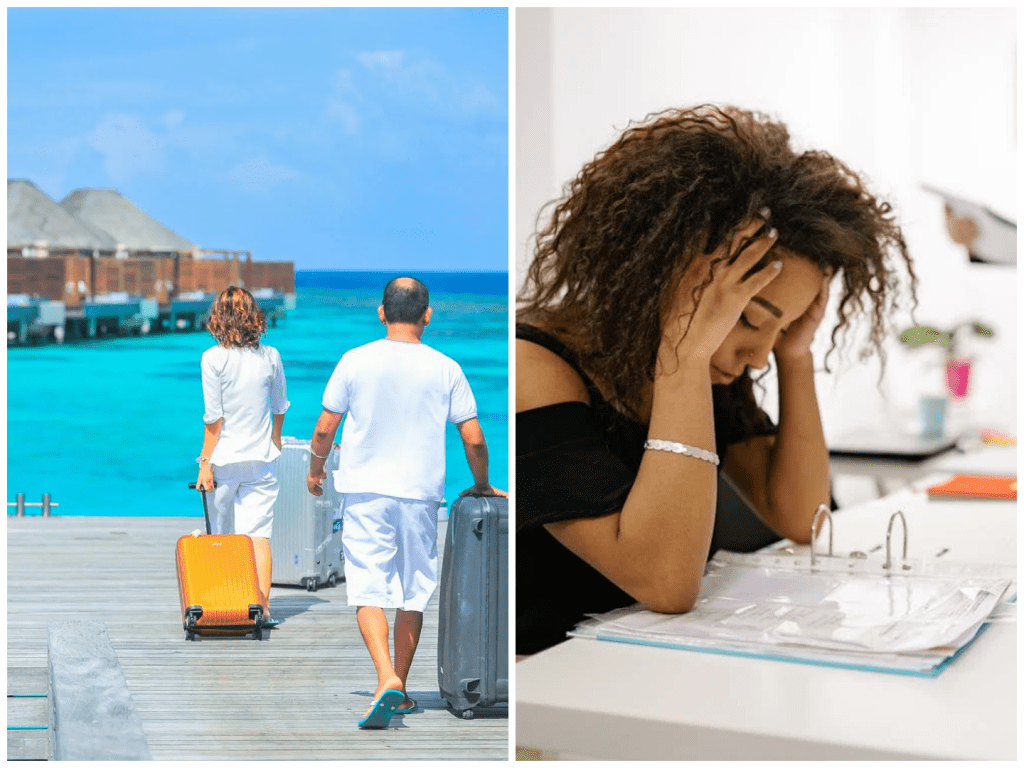Americans Hold the Record for Taking the Least Amount of Vacations — And It’s Hurting More Than Just Their Happiness

Somewhere on a quiet beach in Greece, a couple sips wine as the sun melts into the sea. In a small town in France, neighbors gather in a local café for their third week of summer break. And in the mountains of Switzerland, entire families breathe deeply under open skies, hiking trails they’ve waited all year to return to. Meanwhile, in office buildings across the United States, emails keep pinging, Slack channels stay open, and vacation days quietly expire — unused.
According to the Bureau of Labor Statistics, the average American worker receives just about 11 paid vacation days a year. That’s already low compared to the rest of the developed world, but what’s more shocking is that many Americans don’t even use them. Expedia’s 2024 Vacation Deprivation Report found that U.S. workers took only 12 days off on average last year, and a significant portion still left days unused. Compare that to countries like France, where workers often get 30 paid vacation days and treat them like gold. Or Germany, where time off isn’t just expected — it’s built into the rhythm of life. The contrast is so stark it almost feels cultural. And it is.
The United States has long been known for its hustle. The idea that hard work equals virtue runs deep in the American story. But in today’s world, that same belief may be doing more harm than good. There’s a quiet epidemic happening beneath the surface — one of burnout, stress, and emotional exhaustion. It doesn’t show up in headlines, but you can see it in the tired eyes of the barista working two jobs, the tech worker who hasn’t logged off in months, the mom who answers emails during her kid’s soccer game. People are pushing through when they should be pulling back. And it’s costing more than just their rest.

The irony is, Americans aren’t lazy — they’re working more than ever. But without meaningful breaks, the work starts to hollow out. Studies have shown over and over that time off isn’t just a luxury; it’s a necessity. Rest improves productivity. Time away boosts creativity. Vacations strengthen relationships, heal mental health, and offer perspective you can’t find behind a screen. And yet, even when those few vacation days are granted, the pressure to not take them remains heavy. Some fear falling behind. Others worry about job security. And then there’s the silent badge of honor — the pride in being “too busy” to unplug, as if constant hustle is the only proof of value.
But this mindset doesn’t come without consequences. America leads the world in vacation deprivation, but it also ranks high in stress, anxiety, and workplace burnout. The connection isn’t coincidental. In places where vacation is normalized, people return to work more refreshed, less resentful, and more engaged. In America, many never get that reset. They work through illness. They answer emails on weekends. They save PTO “just in case” and then never use it. Slowly, silently, it chips away at joy.
What’s heartbreaking is how many people don’t even realize what they’re missing. They’ve never known a culture where long lunches, slow walks, or three-week holidays are normal. They don’t know what it feels like to turn off notifications and not feel guilty. And when you’ve lived in that pressure for so long, rest can feel wrong — even selfish. But it isn’t. Rest is human. It’s healing. And it’s long overdue.

This isn’t just a personal issue; it’s a structural one. American companies could do more. Many still offer minimal vacation policies, and some even pride themselves on unlimited PTO — a policy that, ironically, often leads to employees taking less time off due to unclear expectations. In contrast, countries like Sweden and Italy not only guarantee generous leave, but they encourage it. It’s built into their economy. And the result? Healthier, happier citizens. More balanced lives. And still, successful, thriving industries.
If you’ve ever felt guilty about taking a break, you’re not alone. But maybe it’s time to challenge that guilt. Maybe it’s time to ask not “Can I afford to take time off?” but “Can I afford not to?” Because the truth is, vacations aren’t just about beaches and sunsets — they’re about breathing again. Reconnecting with yourself. Making space for your life beyond work. And if the rest of the world has figured out how to do it, maybe America can too.
In the end, this isn’t about comparing countries or cultures. It’s about reclaiming something simple: the right to rest. The chance to live, not just survive. Because no one looks back at their life and wishes they spent more time in meetings or checked more emails on a Sunday. They remember the beach. The laughter. The break. And those are the moments that matter.



